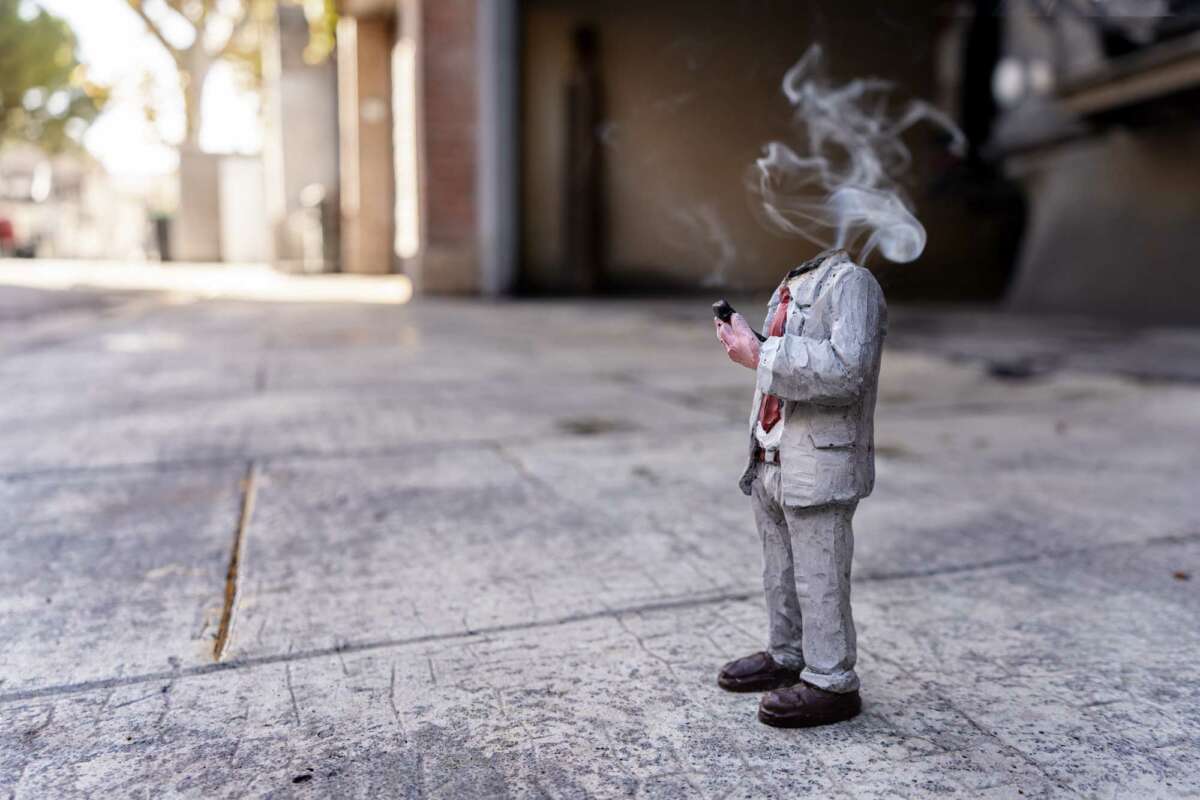Part of the Series
The Public Intellectual
Honest, paywall-free news is rare. Please support our boldly independent journalism with a donation of any size.
Neoliberal capitalism comes under scathing and thought-provoking artistic critique by renowned Spanish artist Isaac Cordal in his politically engaged new exhibition, “Smoke Signals,” which includes miniature sculptures, photography and diverse installations. Cordal uses his miniature statuettes to refigure space, fragment time, point to larger social issues and stand as imperfect constructions of a social order rooted in a mix of absurdity and oppression. Cordal’s sculptures inhabit those abandoned spaces that need to be reclaimed, reimagined and understood as sites of social and political change. In this exhibition, his art offers a searing critique of the capitalist notion of progress and its devastating assault on nature and the planet.
“Smoke Signals,” which will appear June 8-18 at the MURAL Festival in Montreal, continues Cordal’s ongoing project of advocating for the democratization of public space and criticizing neoliberal capitalism while promoting a vision of community that enables open dialogue, shared notions of solidarity, and relations of mutual trust and compassion. Moreover, as Naomi Larsson observed in The Guardian, his art in its various expressions “represent a social stereotype as a critical observation on capitalism, power and bureaucracy.” In the photo essay included at the end of this piece, you can see for yourself some examples of how Cordal’s art challenges the brutality of neoliberal capitalism.
For Cordal, the public space is a site of vital struggle in confronting neoliberal capitalism’s death-driven machinery of misery, inequality, extermination and ecological assault.
Regarding his use of space, Cordal states: “The space has an essential role as it is what gives meaning to the sculptures. The same sculpture depending on the space and its location can change its meaning. I usually choose spaces that are a kind of zoom, a macro universe, generally with a certain dose of decadence.”
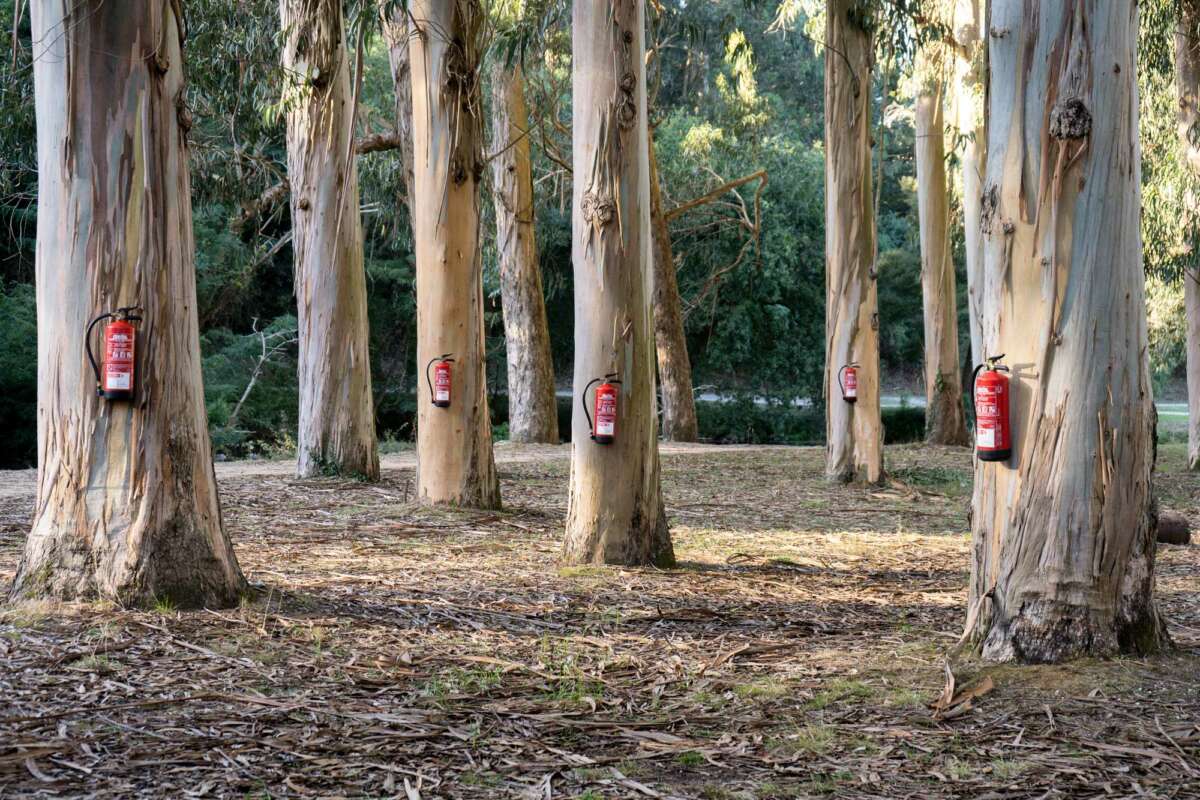
“Smoke Signals” operates as a visual counterpoint to a rising fascist politics that normalizes disaster capitalism and the ongoing destruction of the planet. As public spheres are eliminated and the horizons of radical politics close down, Cordal uses art to find a space in which the language and social relations of democracy can be rethought, reimagined and struggled over. Against the prevailing language of commodification, social atomization, privatization and the militarization of all aspects of the social order, Cordal’s invokes the category of smoke to define a mode of mystification, normalization and depoliticization that renders the brutality of capitalism as common sense, unalterable, and beyond individual and collective resistance.
Commenting on the political nature of his art and the importance of such criticism, he writes: “I think politics is in everything. Every little everyday act is subject to its pervasive power…. I think it is important not to lose the capacity for self-criticism and to reflect on everything around us,” especially in the desolate landscape created by capitalism.
At the same time, he reminds us that smoke can serve not only the reactionary forces of gangster capitalism, but also serve as a warning of the dangers of historical and social amnesia and the need to act in the face of an impending political, cultural and social catastrophe. “Smoke Signals” makes clear in its provocative imagery a pressing call to resist the suspension of moral judgment and the far right’s extreme contempt for democratic and civil liberties at the core of an emerging global fascist politics. Moreover, it asserts Cordal’s ongoing struggle over public space and his continued efforts to intervene and reclaim it on the side of justice, democracy and equity.
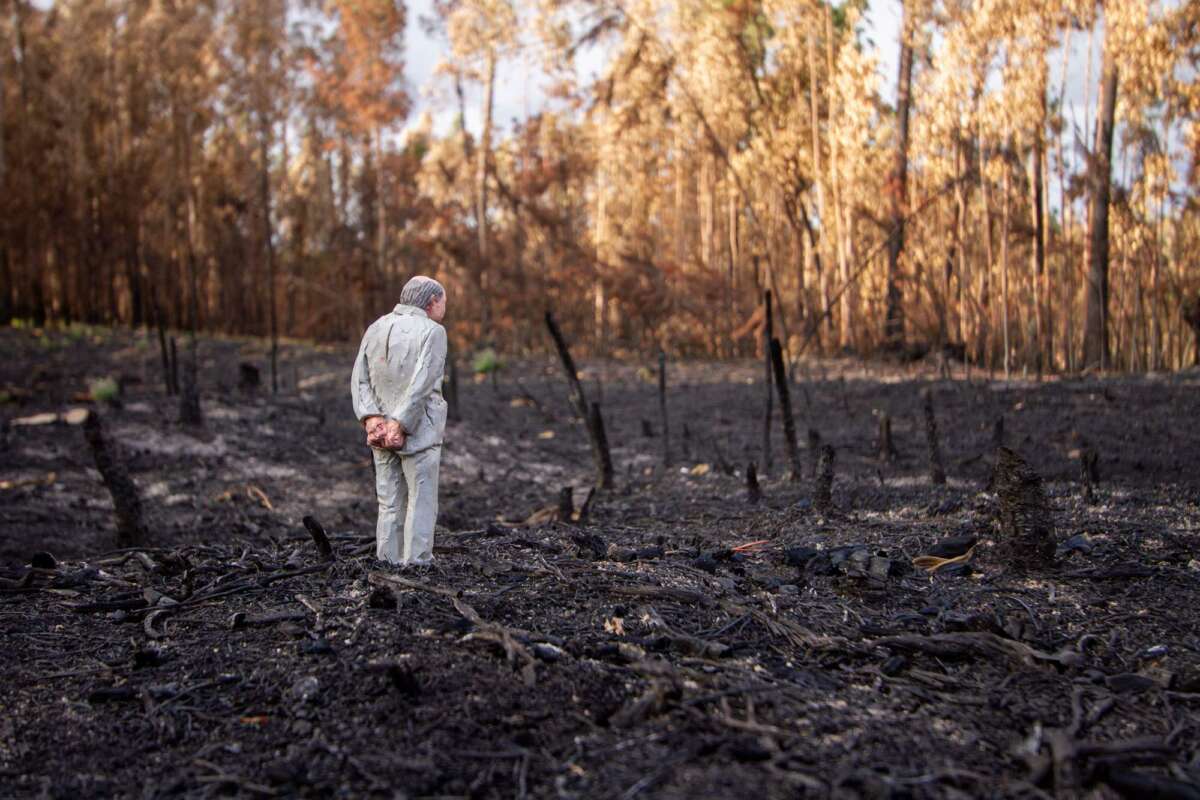
Echoing the work of Angela Davis, Gina Dent, and others, Cordal’s cultural politics and art aims at developing radical sites of political education that embrace solidarity, share language, strategies, critical analyses, and construct openings in which people can learn and practice how to hold power accountable.
“Smoke Signals” … continues Cordal’s ongoing project of advocating for the democratization of public space.
Cordal’s installation reveals in stark images the misery and destruction that comes with the death of civic culture, social responsibility and critical agency, and with the willingness of depoliticized masses to look away. Cordal’s images travel through a geography of violence that extends from the attack on critical education and the celebration of mass ignorance, to incomprehensible environmental destruction and the brutality of a politics that embraces racial cleansing, the banning of books, the erasure of trans people, the attack on public goods, and support for Christian nationalism and white supremacy. There is an urgency in his images that both display the horror of individuals who refuse to struggle against the unthinkable, and the need for a politicized vision in which a robust public imagination rejects the corrosion of memory, social disintegration and a language of relentless violence that produces what Jonathan Crary refers to as an “annihilating nihilism” in the age of a death-driven capitalism. Cordal’s images speak to the terror that accompanies the right-wing attack on history, memory and historical consciousness, all of which produce a form of moral insensitivity and a crisis of thinking and agency.
Rather than freeze history in a cultural politics of normalization and common sense, Cordal uses the power of the image to make power visible. These images enable a discourse of both critique and possibility that simultaneously fashions modes of critical agency capable of implementing acts of collective resistance and promotes a radical demand for structural and institutional change. Cordal’s “Smoke Signals” reveal the endpoint of a society in which historical memory disappears, justice is transformed into a malignant injustice, and the call to freedom loses its ethical bearings and potential for moral witnessing. But rather than produce an art all too willing to live with or ignore the ghosts of the past, Cordal invokes a cultural politics in which the past is never dead, and in more concrete terms, echoes Primo Levi’s claim that, “Every age has its own fascism, and we see the warning signs wherever the concentration of power denies citizens the possibility and the means of expressing and acting on their own free will.”
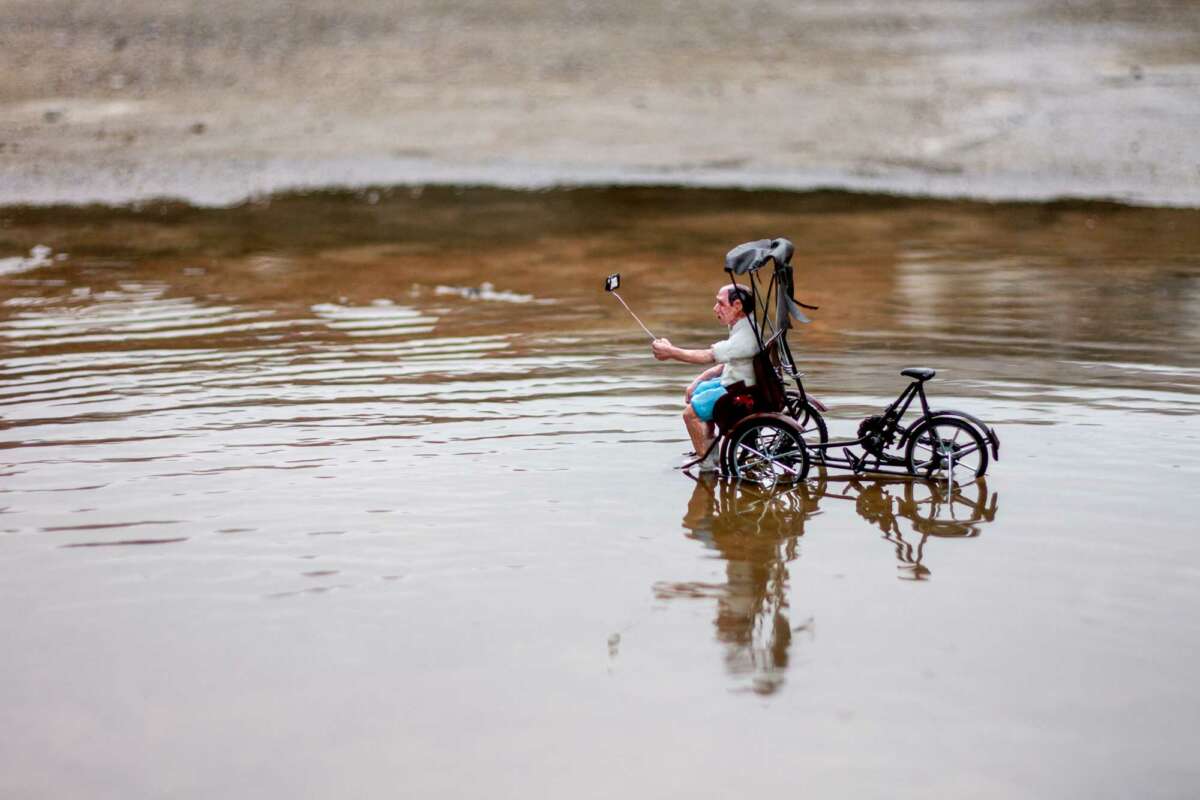
Against this updated form of fascist politics, Cordal makes education central to an image-based project that challenges the vacant politics of the social media sphere with its celebration of a culture of immediacy, its creed of self-interest, reactionary individualism, and its attack on conscience and empathy. Rather than marketing memory, a stripped-down notion of the social and a regressive notion of agency, Cordal provides signposts of an impending danger, and the need to act on the assumption that the future does not have to replicate the present capitalist nightmare. Cordal’s miniature installations provocatively raise the question of what kind of future we want, and how matters of economics, education, politics and social relations can be reimagined in the image of a democratic socialist social order. What is crucial to Cordal’s “Smoke Signals” is that it embodies a mode of critical education in which the ability to shift power relations is inextricably related to images that speak to our daily experiences, allow us to reimagine our relations to others and the world, while producing a cultural politics that enables the public to reimagine themselves as critically engaged agents.
Cordal’s work imagines a world in which human beings are connected to a mode of politics and solidarity that embraces democracy as a continuous struggle for equality, freedom and justice. His installations and images make visible the horrors of a world rooted in injurious violence and a death drive that is at the center of gangster capitalism. Against this death-driven politics that allows the domestication of the unimaginable, Cordal provides an educational and cultural politics that makes visible the forces of violence, ignorance, misery and disposability. In doing so, he makes clear that central to resisting the forces of neoliberal fascism is the creation of a critical consciousness, civic literacy, and collective politics fundamental to opposing an increasing authoritarianism willing to destroy human life and the planet while legitimating a social order that elevates greed, inequality, wealth, and power over the common good and vital social needs. Violence has become central to a spectacularized capitalism that proliferates in the social and mainstream media. Cordal refigures the spectacularized images of violence as part of a cultural politics that expands critical thinking rather than shut it down. His images challenge the terror of social atomization and a politics that reduces social habits and political agency to silence.
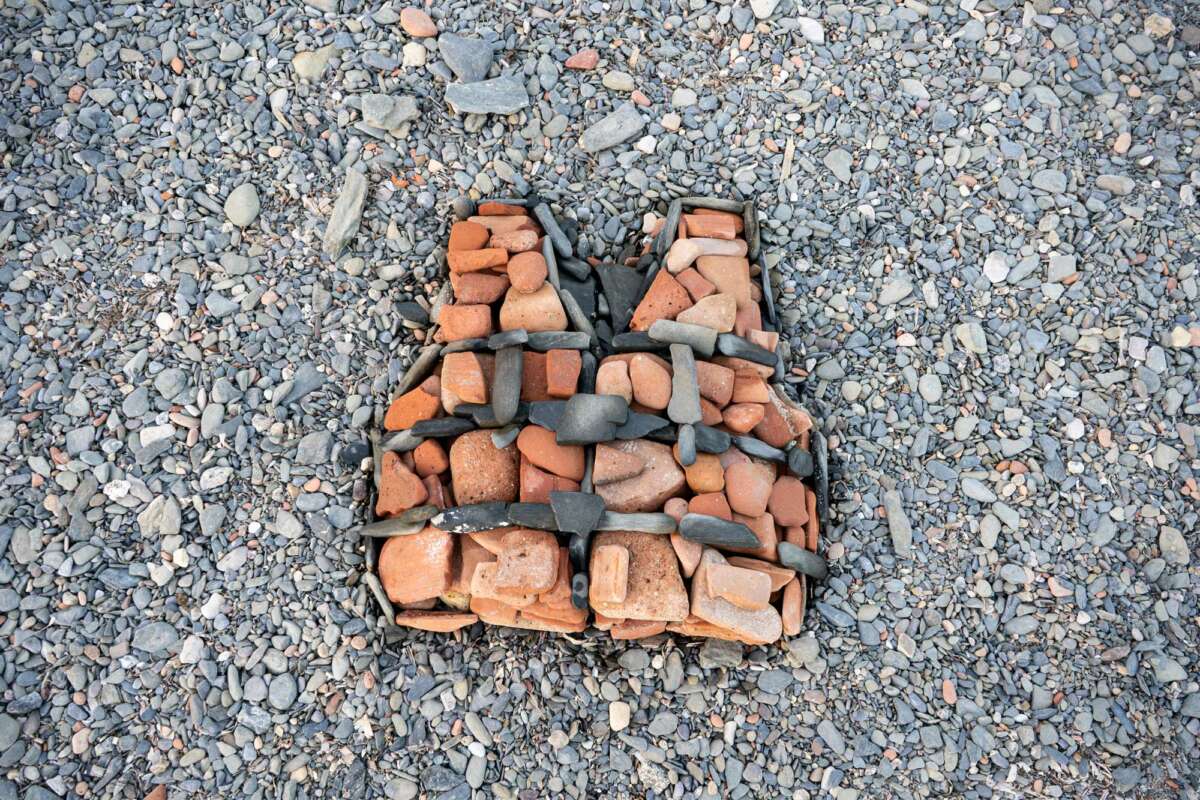
Cordal argues that “our societies are built on violence, and that heritage … which is capitalism still remains.” This view is evident in much of his work. See for example, his compelling series on The School in which he imagines education as a laboratory of violence, turned into a factory and form of medical experimentation designed to repress students and kill their imagination. In this portrayal, knowledge in schools is produced as a kind of poisonous virus — an apt metaphor given the attack on education in the U.S. by proto-fascists such as Florida Gov. Ron DeSantis, who trades in banning books, censoring Black history curricula and attacking trans students, among other issues.
At the core of “Smoke Signals” is a call to reject the rule of fear and bigotry and fight for a radically democratic future that is waiting to be made. It is a call to justice, moral witnessing and a collective politics that echoes Bryan Stevenson’s view that “there is something better waiting for us … something that feels more like freedom, more like equality, more like justice … for all of us.”
“Smoke Signals” represents not only a call for a change in language, politics, the public imagination and historical memory, but also a call for a cultural politics as a crucial site where the struggle for a radical democracy can be waged. Against those reactionary forces that call for the demolition of history, critical consciousness and mass resistance, Cordal views education and cultural politics as vital to challenging these forces of domination. At work here is not just an ocular politics of critique and possibility, but also the call for a new vision, language, and politics capable of fighting and overthrowing those societies in which democracy has turned phantom-like. This is a language in which art addresses social problems, education becomes central to politics, capitalism is viewed as the enemy of democracy and mass resistance works to change consciousness through its embrace of cultural politics.
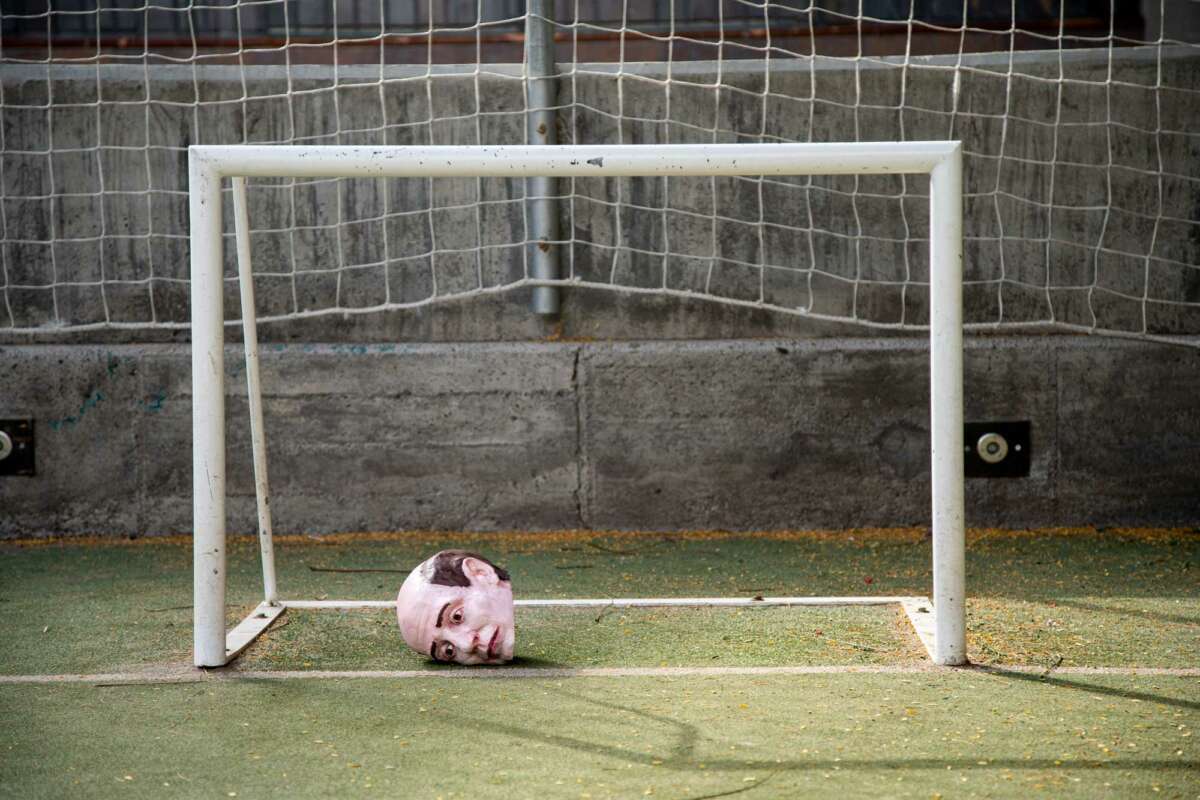
Cordal’s language calls upon cultural workers to use images, social media, and other artistic expressions in a wide variety of sites; this is a language that suggests that cultural workers become border crossers, employing a diverse range of cultural practices in order to give new meaning to the purpose of what it means to be a public intellectual and engaged cultural worker. In many ways, Cordal’s language and politics are attentive to the ways in which capitalism appropriates a fascist politics, and they show how art can not only make visible the horrors of fascism, but also how it can be confronted.
For Cordal, the brutality of capitalism does more than cloud and choke the ideals and promise of democracy — it also presents an impeding fire that needs to be extinguished if fascism is to be resisted.
For Cordal, art and politics merge in the hope of renewed visions, the emergence of new possibilities, and a restored sense of collective struggle for a more humane and socially just society that can materialize not as a fantasy but as a reality.
Cordal’s art offers us the opportunity to rethink justice, equality, freedom, dignity and compassion as they unfold in their fullest way with others. Cordal’s art provides the public with the opportunity to confront the horrors of the present and to dream again, imagine the unimaginable and think otherwise in order to act otherwise.
Media that fights fascism
Truthout is funded almost entirely by readers — that’s why we can speak truth to power and cut against the mainstream narrative. But independent journalists at Truthout face mounting political repression under Trump.
We rely on your support to survive McCarthyist censorship. Please make a tax-deductible one-time or monthly donation.
